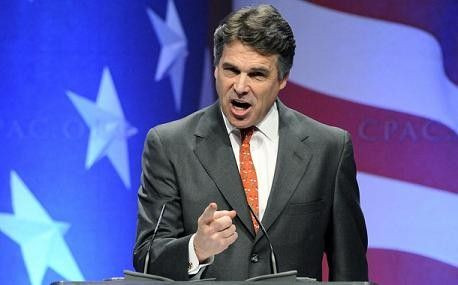Rick Perry Accuses Bernanke of ?Treason?: Does He Have a Point?
(COLUMN)

GOP presidential hopeful Rick Perry is not shy about using strong words. At a campaign event in Iowa, Perry said if Federal Reserve Chairman Ben Bernanke prints more money, it would be “almost treasonous.”
He also said “we would treat him pretty ugly down in Texas.” Treason, meanwhile, carries the ugly sentence of execution under U.S. law.
Perry isn’t likely calling for an execution of Bernanke. However, what he and other conservatives are alleging is that Bernanke’s money printing is a betrayal of the U.S. middle class.
Their main argument is that loose monetary policy, especially the money-printing program of quantitative easing, is an invisible tax on U.S. workers.
Loose monetary policy stokes inflation. Over the last few decades, monetary policy has been loose under Bernanke and Alan Greenspan before him. Inflation, predictably, was high.
Because of the high inflation, $100 in 1960 is worth only $13.11 in 2011, according to the U.S. government’s CPI calculations. Critics, moreover, argue that the CPI inadequately captures the inflation in health care and education, which means the 1960 $100 is probably worth less than $13.11.
The devaluation of U.S. middle class purchasing power, without a comparable increase in wages, represents what the conservatives call the invisible inflation tax.
The inflation tax is less pronounced in the ultra-rich because their assets and income are tied to capital and investments, which keep pace with inflation.
In fact, loose monetary conditions arguably redistribute wealth from middle-class taxpayers to the ultra-rich because of government bailouts, which is the second major complaint of conservatives against the Federal Reserve.
During times of loose money, the economy booms. However, it mostly benefits top executives, owners of assets, and owners of capital. The working class, meanwhile, sees only modest increase in wages.
When the loose money bubble pops, like it did in 2008, the government is forced to step in with taxpayer money pooled from the entire U.S. population, including the middle class, which didn’t benefit that much from the boom. The Federal Reserve, meanwhile, is forced to loosen monetary policy (which later stokes inflation).
So who is the beneficiary of the invisible inflation tax?
The U.S. government, the biggest debtor in the world, is the biggest beneficiary because inflation lessens their debt burden that is fixed in nominal terms.
It is using its safe-haven and reserve currency status to take advantage of savers and lenders around the world. (The other victim of the U.S. inflation process, as stated above, is the U.S. middle class who do not own capital and assets and whose wages do not keep up with inflation).
So while it’s hard to accuse the Fed chairman of actual treason, Perry can certainly make the case that his money printing policies are betraying the U.S. middle class.
Bernanke, of course, claims he is merely fulfilling his dual mandate of maintaining price stability (against deflation) and full employment by printing money.
© Copyright IBTimes 2024. All rights reserved.





















